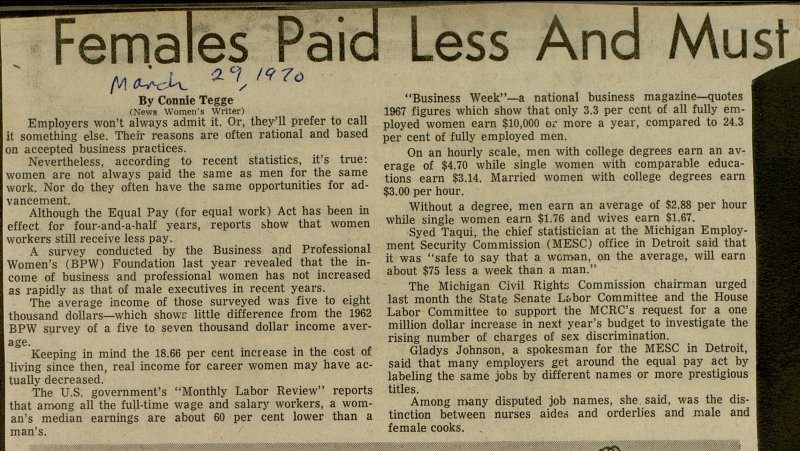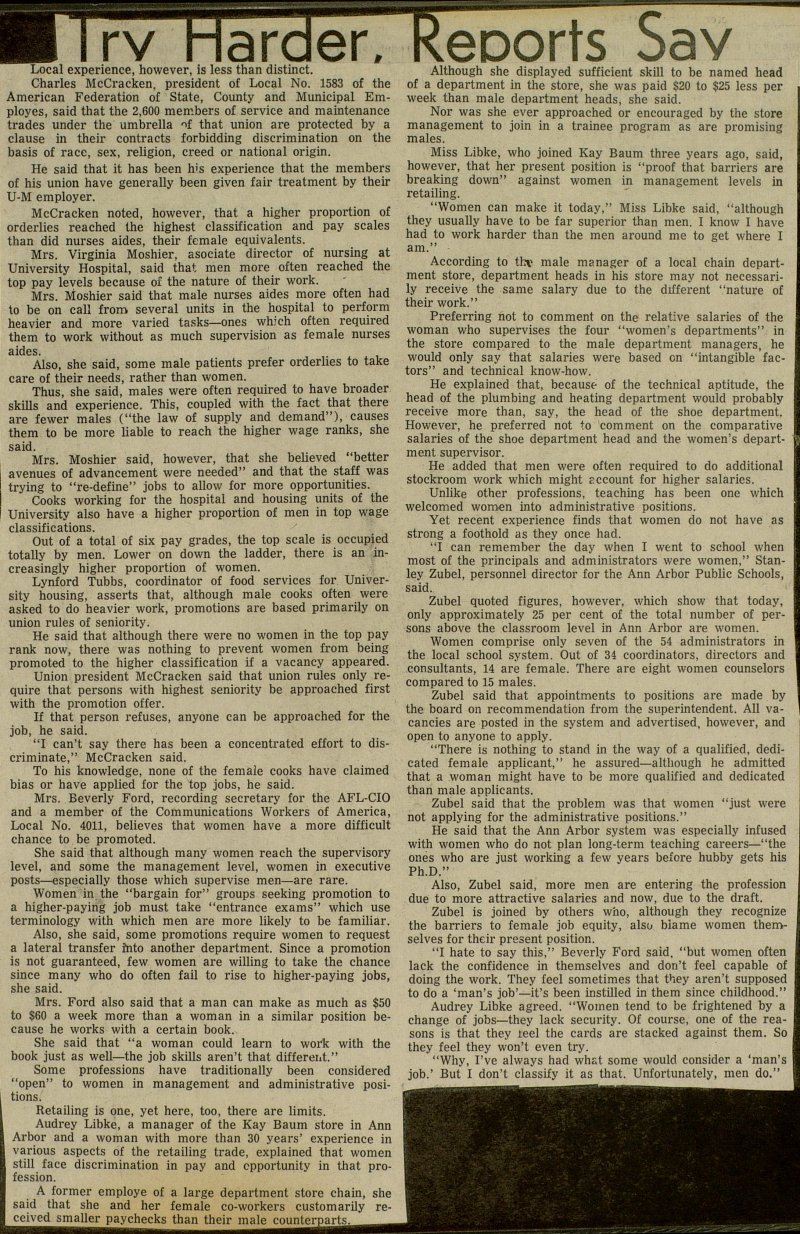Females Paid Less And Must Try Harder, Reports Say


(News women s wrnerj Employers won't always admit it. Or, they'll prefer to cali it something else. Their reasons are often rational and based jn accepted business practices. Nevertheless, according to recent statistics, it's true: women are not always paid the same as men for the same work. Nor do they often have the same opportunities for advancement. Although the Equal Pay (for equal work) Act has been in effect for four-and-a-half years, reports show that women workers still receive less pay. A survey conducted by the Business and Professional Women's (BPW) Foundation last year revealed that the income of business and professional women has not increased as rapidly as that of male executives in recent years. The average income of those surveyed was five to eight thousand dollars- which shows little difference from the 1962 BPW survey of a five to seven thousand dollar income average. Keeping in mind the 18.66 per cent increase in the cost of living since then, real income for career women may have actually decreased. The U.S. government's "Monthly Labor Review" reports that aroong all the full-time wage and salary workers, a woman's median earnings are about 60 per cent lower than a man's. "Business Week"- a national business magazine- quotes 1967 figures which show that only 3.3 per cent of all fully employed women earn $10,000 o: more a year, compared to 24.3 oer cent of fully employed men. On an hourly scale, men with college degrees earn an erage of $4.70 while single women with comparable educations earn $3.14. Married women with college degrees earn f3.00 per hour. Without a degree, men earn an average of $2.88 per hour while single women earn $1.76 and wives earn $1.67. Syed Taqui, the chief statistician at the Michigan Employment Security Commission (MESC) office in Detroit said that it was "safe to say that a woman, on the average, will earn about $75 less a week than a man." The Michigan Civil Rights Commission chairman urged last month the State Senate Lí.bor Committee and the House Labor Committee to support the MCRC's request for a one million dollar increase in next year's budget to investígate the rising number of charges of sex discrimination. Gladys Johnson, a spokesman for the MESC in Detroit, said that many employers get around the equal pay act by labeling the same jobs by different names or more prestigious titles. Among many disputed job ñames, she. said, was the distinction between nurses aides and orderlies and male and female cooks.
Local experience, however, is less than distinct. Charles McCracken, president of Local No. 1583 of the American Federation of State, County and Municipal Employés, said that the 2,600 members of service and maintenance trades under the umbrella if that unión are protected by a clause in their contracts forbidding discrimination on the basis of race, sex, religión, creed or national origin. He said that it has been hs experience that the members of his union have generally been given fair treatment by their U-M employer. McCracken noted, however, that a higher proportion of orderlies reached the highest classification and pay scales than did nurses aides, their female equivalents. Mrs. Virginia Moshier, asocíate director of nursing at University Hospital, said that men more often reached the top pay levéis because of the nature of their work. Mrs. Moshier said that male nurses aides more often had to be on cali from several units in the hospital to perform heavier and more varied tasks- ones which often required them to work without as much supervisión as female nurses aides. Also, she said, some male patients prefer orderlies to take care of their needs, rather than women. Thus, she said, males were often required to have broader skills and experience. This, coupled with the fact that there are fewer males ("the law of supply and demand"), causes them to be more liable to reach the higher wage ranks, she said. Mrs. Moshier said, however, that she believed "better avenues of advancement were needed" and that the staff was trying to "re-define" jobs to allow for more opportunities. Cooks working for the hospital and housing units of the University also have a higher proportion of men in top wage classifications. Out of a total of six pay grades, the top scale is occupied totally by men. Lower on down the ladder, there is an increasingly higher proportion of women. Lynford Tubbs, coördinator of food services for University housing, asserts that, although male cooks often were asked to do heavier work, promotions are based primarily on union rules of seniority. He said that although there were no women in the top pay rank now, there was nothing to prevent women from being promoted to the higher classification if a vacancy appeared. Union president McCracken said that union rules only require that persons with highest seniority be approached first with the promotion offer. If that person refuses, anyone can be approached for the job, he said. "I can't say there has been a concentrated effort to discrimínate, " McCracken said. To his knowledge, none of the female cooks have claimed bias or have applied for the top jobs, he said. Mrs. Beverly Ford, recording secretary for the AFL-CIO and a member of the Communications Workers of America, Local No. 4011, believes that women have a more difficult chance to be promoted. She said that although many women reach the supervisory level, and some the management level, women in executive posts- especially those which supervise men - are rare. Women in the "bargain for" groups seeking promotion to a higher-paying job must take "entrance exams" which use terminology with which men are more likely to be familiar. Also, she said, some promotions require women to request a lateral transfer fnto another department. Since a promotion is not guaranteed, few women are willing to take the chance since many who do often fail to rise to higher-paying jobs, she said. Mrs. Ford also said that a man can make as much as $50 to $60 a week more than a woman in a similar position because he works with a certain book. She said that "a woman could learn to work with the book just as well- the job skills aren't that different." Some professions have traditionally been considered "open" to women in management and administrative positions. Retailing is one, yet here, too, there are limits. Audrey Libke, a manager of the Kay Baum store in Ann Arbor and a woman with more than 30 years' experience in various aspects of the retailing trade, explained that women still face discrimination in pay and cpportunity in that profession. A former employé of a large department store chain, she said that she and her female co-workers customarily received smaller paychecks than their male connt.ernart.s. Although she displayed sufficient skill to be named head of a department in the store, she was paid $20 to $25 less per week than male department heads, she said. Nor was she ever approached or encouraged by the store management to join in a trainee program as are promising males. Miss Libke, who joined Kay Baum three years ago, said, ho wever, that her present position is "proof that barriers are breaking down" against women in management levéis in retailing. "Women can make it today," Miss Libke said, "although they usually have to be far superior than men. I know I have had to work harder than the men around me to get where I am." According to thv male manager of a local chain department store, department heads in his store may not necessarily receive the same salary due to the different "nature of their work." Preferring not to comment on the relative salaries of the woman who supervises the four "women's departments" in the store compared to the male department managers, he would only say that salaries were based on "intangible factors" and technical know-how. He explained that, because of the technical aptitude, the head of the plumbing and heating department would probably receive more than, say, the head of the shoe department. However, he preferred not to comment on the comparative salaries of the shoe department head and the women's department supervisor. He added that men were often required to do additional stockroom work which might account for higher salaries. Unlike other professions, teaching has been one which welcomed women into administrative positions. Yet recent experience finds that women do not have as strong a foothold as they once had. "I can remember the day when I went to school when most of the principáis and administrators were women," Stanley Zubel, personnel director for the Ann Arbor Public Schools, said. Zubel quoted figures, however, which show that today, only approximately 25 per cent of the total number of persons above the classroom level in Ann Arbor are women. Women comprise only seven of the 54 administrators in the local school system. Out of 34 coördinators, directors and consultants, 14 are female. There are eight women counselors compared to 15 males. Zubel said that appointments to positions are made by the board on recommendation from the superintendent. All vacancies are posted in the system and advertised, however, and open to anyone to apply. "There is nothing to stand in the way of a qualified, dedicated female applicant," he assured - although he admitted that a woman might have to be more qualified and dedicated than male applicants. Zubel said that the problem was that women "just were not applying for the administrative positions." He said that the Ann Arbor system was especially infused with women who do not plan long-term teaching careers- "the ones who are just working a few years before hubby gets his Ph.D." Also, Zubel said, more men are entering the profession due to more attractive salaries and now, due to the draft. Zubel is joined by others who, although they recognize the barriers to female job equity, also biame women themselves for their present position. "I hate to say this," Beverly Ford said, "but women often lack the confidence in themselves and don't feel capable of doing the work. They feel sometimes that they aren't supposed to do a 'man's job'- it's been instilled in them since childhood." Audrey Libke agreed. "Women tend to be frightened by a change of jobs- they lack security. Of course, one of the reasons is that they teel the cards are stacked against them. So they feel they won't even try. "Why, I've always had what some would consider a 'man's job.' But I don't classify it as that. Unfortunately, men do."
Article
Subjects
Connie Tegge
Ann Arbor News
Old News